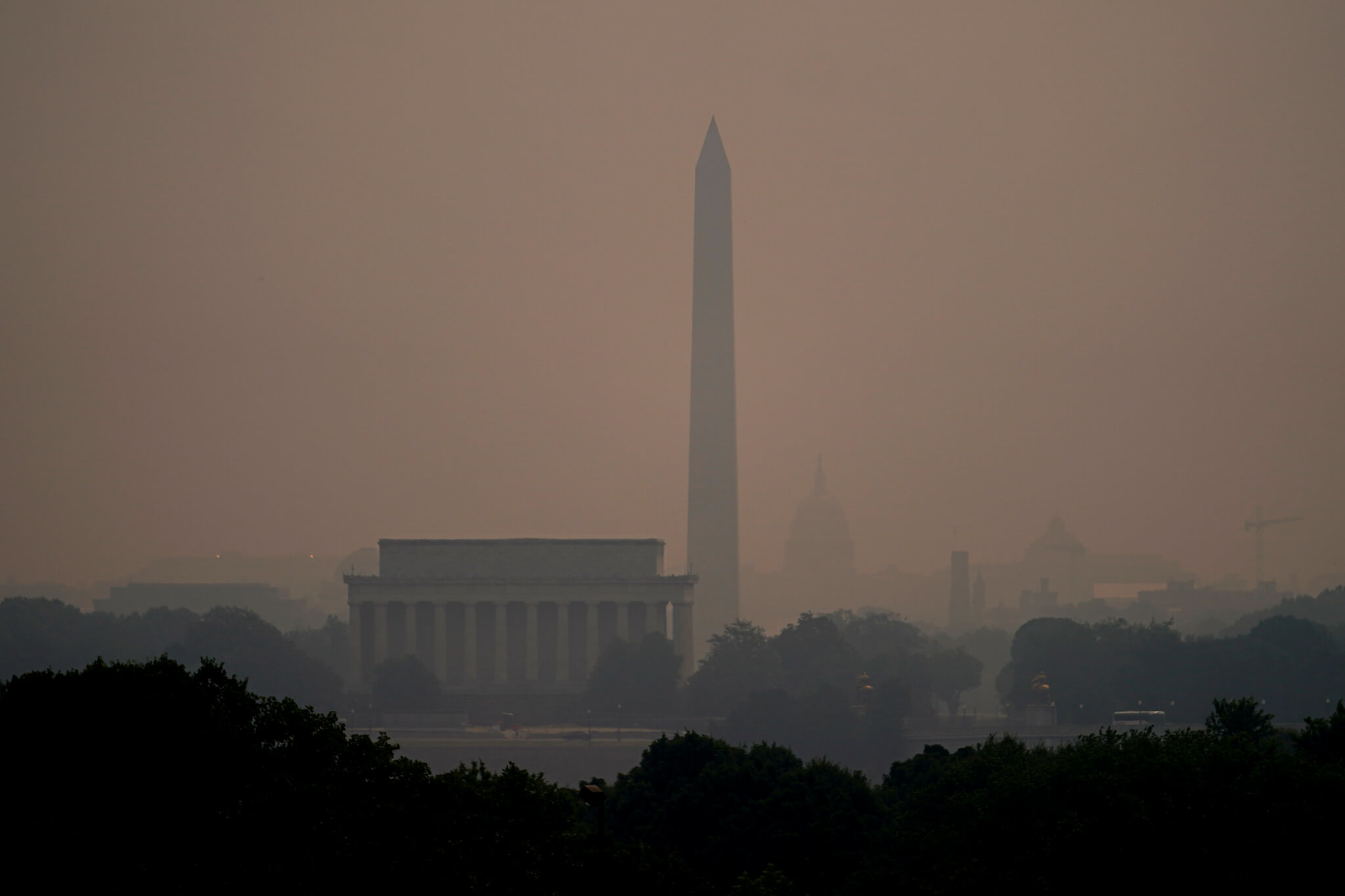
Haze blankets over monuments on the National Mall in Washington, Wednesday, June 7, 2023, as seen from Arlington, Va. (AP Photo/Julio Cortez)
Virginia’s Air Pollution Control Board – which has a majority of Gov. Glenn Youngkin-appointed members – voted to remove the state from the Regional Greenhouse Gas Initiative. Here’s what it means for Virginians, especially those living in flood-prone areas.
Virginia’s seven-member Air Pollution Control Board voted 4-3 on Wednesday to remove the commonwealth from the Regional Greenhouse Gas Initiative (RGGI), a multi-state coalition working to curb power plant emissions and reduce their harmful impacts on the environment via a “cooperative, market-based effort.”
Virginia joined the coalition in 2020, a move that was considered one of Virginia Democrats’ signature successes after they won control of every branch of state government after the 2019 elections. The Old Dominion is the southernmost state in the coalition; other states participating in the initiative are Connecticut, Delaware, Maine, Maryland, Massachusetts, New Hampshire, New Jersey, New York, Pennsylvania, Rhode Island, and Vermont.
The basic idea is that this cap-and-invest initiative will help the participating states work to transition their generating capacity to renewable sources of energy, like solar and wind.
The effort had been lauded by environmentalists in Virginia, who say that the benefits of the RGGI are vast. According to them, reducing greenhouse gas emissions in the state is the most effective way to fight against the “carbon-driven climate crisis” while also “reducing the prominence of harmful air pollutants associated with burning fossil fuels.”
Gov. Glenn Youngkin, however, made pulling Virginia out of the RGGI a priority upon taking office in 2022. In a statement he released Wednesday, the governor lauded the Air Pollution Control Board’s vote to remove the state from the initiative, claiming that the move will save Virginia’s power customers money without specifying how much such cost savings will amount to. Youngkin also claims that the RGGI “does nothing to reduce pollution.”
A February 2022 poll from the Wason Center for Civic Leadership at Christopher Newport University found that Virginia voters strongly support remaining in RGGI; more than two-thirds of voters (67%) say they favor remaining in the initiative, with just 26% calling for an exit.
Last year, Youngkin had the unusual opportunity to appoint four of the Air Pollution Control Board’s seven members after political infighting led Republican lawmakers to block two appointments from the previous administration. Governors typically appoint just two members of the board each year.
The Virginia Policy Director for the Natural Resources Defense Council Walton Shepherd described Youngkin’s appointees as “ill-suited to serve” when they were announced last year, citing their backgrounds as:
- “a lead attorney for polluters’ previous doomed attempt to destroy RGGI;”
- a former “senior counsel for the owner of one of Virginia’s largest and highest-polluting coal plants” who has called for doing away with the board on which he currently serves;
- a “longtime coal lobbyist;” and
- another regulated industry representative.
The move by Youngkin’s Air Pollution Control Board comes as the year’s hurricane season is kicking off, a time of year that often brings floods to many of Virginia’s coastal communities. Environmental advocates say that pulling out of RGGI will have the greatest impact on flood-prone communities in the state, such as Suffolk and Norfolk.
The area surrounding Kimberly Bridge in the former has flooded several times in the past five years, according to Inside Climate News. This area was granted $150,000 by the state’s Community Flood Preparedness Fund (CFPF) last year, which was established through the RGGI. Before this fund was established, areas such as these had to wait for a disaster, such as a hurricane or major storm, to occur before drawing on money available for resilience work.
So far, the RGGI has generated about $590 million for the Community Flood Preparedness Fund (CFPF), as well as energy efficiency measures for low-income Virginians, who are typically the most vulnerable to the effects of significant flooding. Twenty-five percent of the money dispersed through the RGGI must go to projects in these low-income areas.
“Rather than just dealing with the impacts after that happens and helping people rebuild, we have funding mechanisms now in place because of [RGGI] to actually address the problems before they happen,” said Michael Town, executive director of the Virginia League of Conservation Voters.
Richmond’s RGGI funding has been going towards resilience planning in Windsor Farms, floodplain development reviews and drainage improvements on McGuire and Chapel drives, and a review of the city’s three-decade-old levee systems. Richmond has also received $7.5 million from the CFPF to go toward the purchase of Mayo Island, which has been designated as a “Special Flood Hazard Area” by the Federal Emergency Management Agency. This grant will help clear the way for the installation of buffers to minimize harmful runoff from the island, as well as the restoration of the floodplain to its “natural and beneficial function,” according to NPR.
Withdrawing from the RGGI would have major implications both environmentally and politically. Sea levels around Virginia are projected to rise anywhere from one to six feet in the next 50 years, according to the Mid-Atlantic Regional Integrated Sciences and Assessments program. If this happens, tidal flooding will not only become more common, but floodwaters will also be pushed further inland. Politically, without backing from the RGGI, the CFPF would still exist, but funding would be subject to annual budgetary approval by the General Assembly, making the fund more dependent on lawmakers and prevailing political winds.
LCV’s Shepherd decried the Air Pollution Control Board’s move, promising that the “courts will knock this unlawful action down.”
“RGGI is the only source of statewide funding in Virginia dedicated to local flood protections, having allocated over $200 million to finance nearly 100 flood projects in Virginia,” he said in a statement. “Yet Governor Youngkin wants to play a reckless political game with people’s homes and lives, while proposing zero climate solutions of his own.”

VIDEO: Your support matters!
Your support matters! Donate today. @vadogwoodnews Your support matters! Visit our link in bio to donate today. #virginianews #virginia #community...

Op-Ed: Virginia’s new Democratic majorities pass key bills to improve your lives, but will Youngkin sign them?
The 2024 Virginia General Assembly regular session has wrapped up. It was a peculiar session from the outset, with Democratic majorities in the...

Op-Ed: Why Virginia Needs A Constitutional Amendment Protecting Reproductive Freedom
Virginia’s recent election season in 2023 drew in eyes from all over the country. Reproductive freedom was on the line and Virginia remained the...

From the state rock to the state flower, here’s how Virginia got its symbols
Have you ever wondered why the Dogwood is the state flower? Or how the cardinal became the state bird? We’re here to answer those questions and more...

VIDEO: Second-gentleman Douglas Emhoff gives speech on reproductive freedom
Second gentleman, Douglas Emhoff touched on reproductive freedom not only being a woman's issue but "an everyone's issue" during the Biden-Harris...

Glenn Youngkin and the terrible, horrible, no good, very bad night
Election Day 2023 has come and gone, and while there are votes to be counted, one thing is perfectly clear: Virginians unequivocally rejected Gov....





